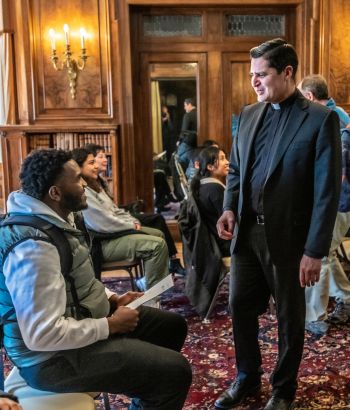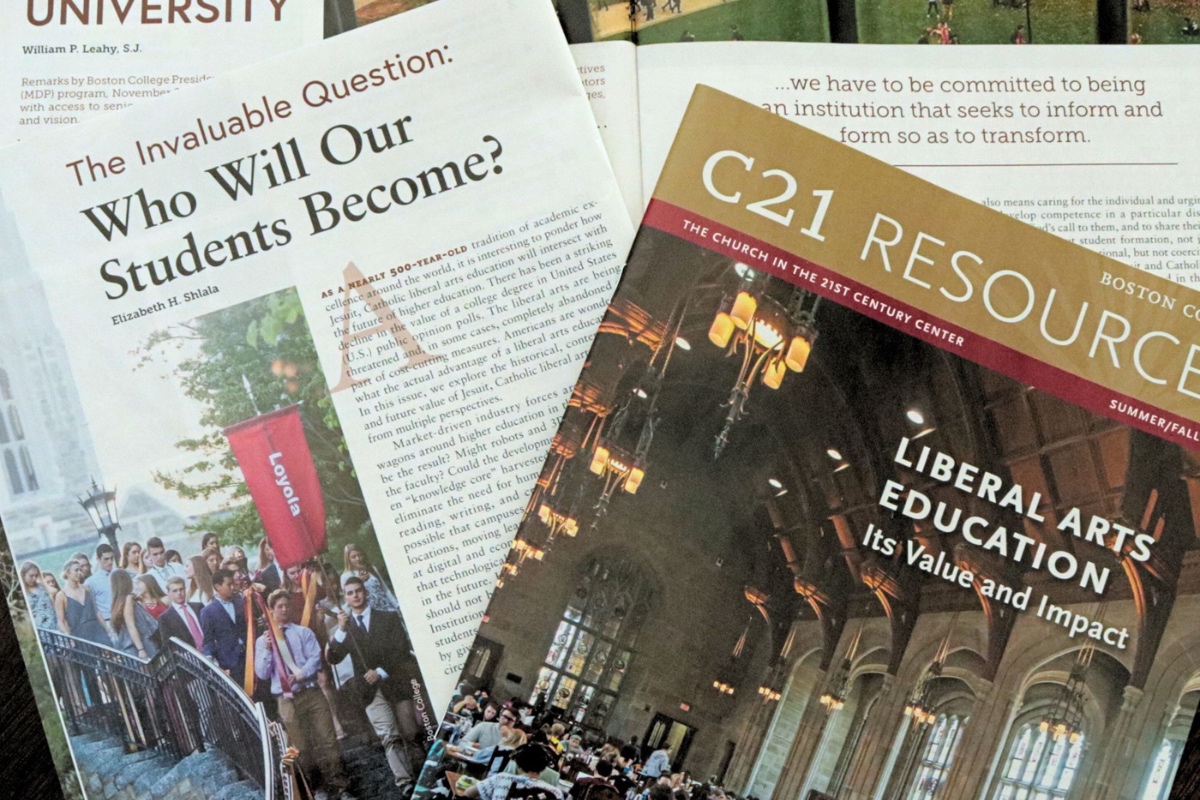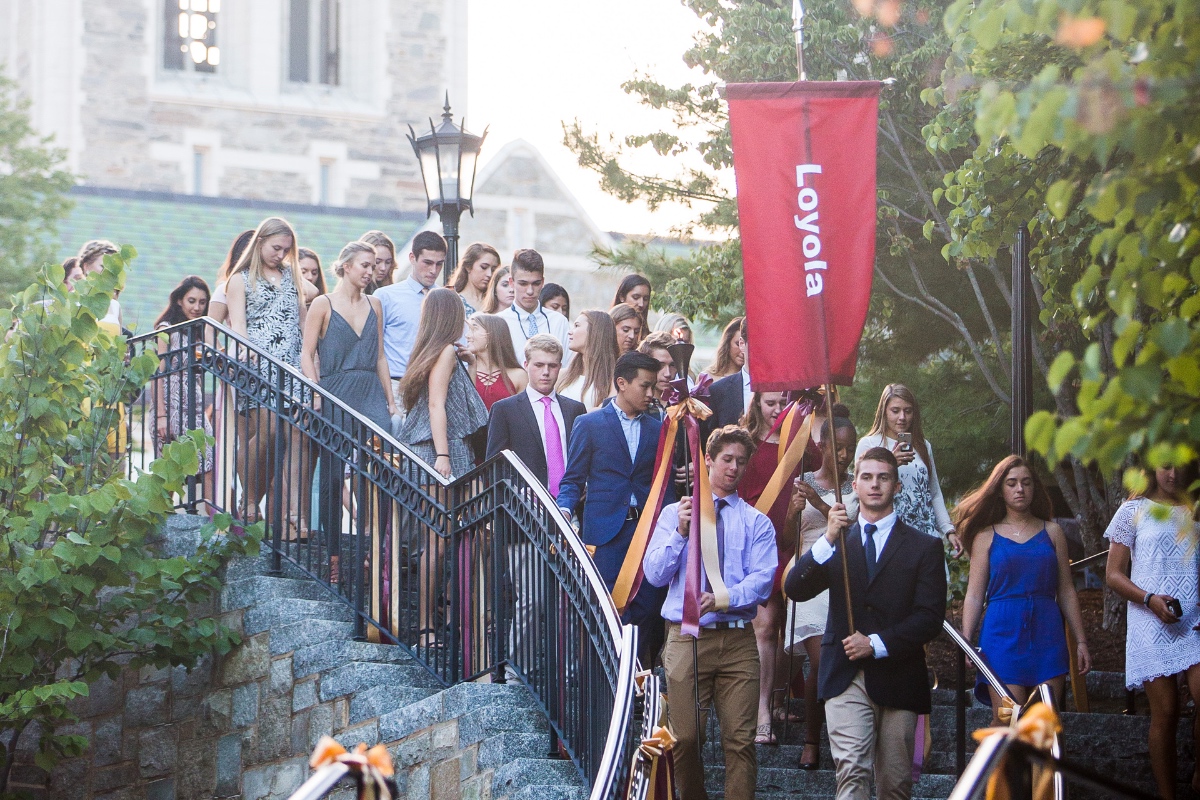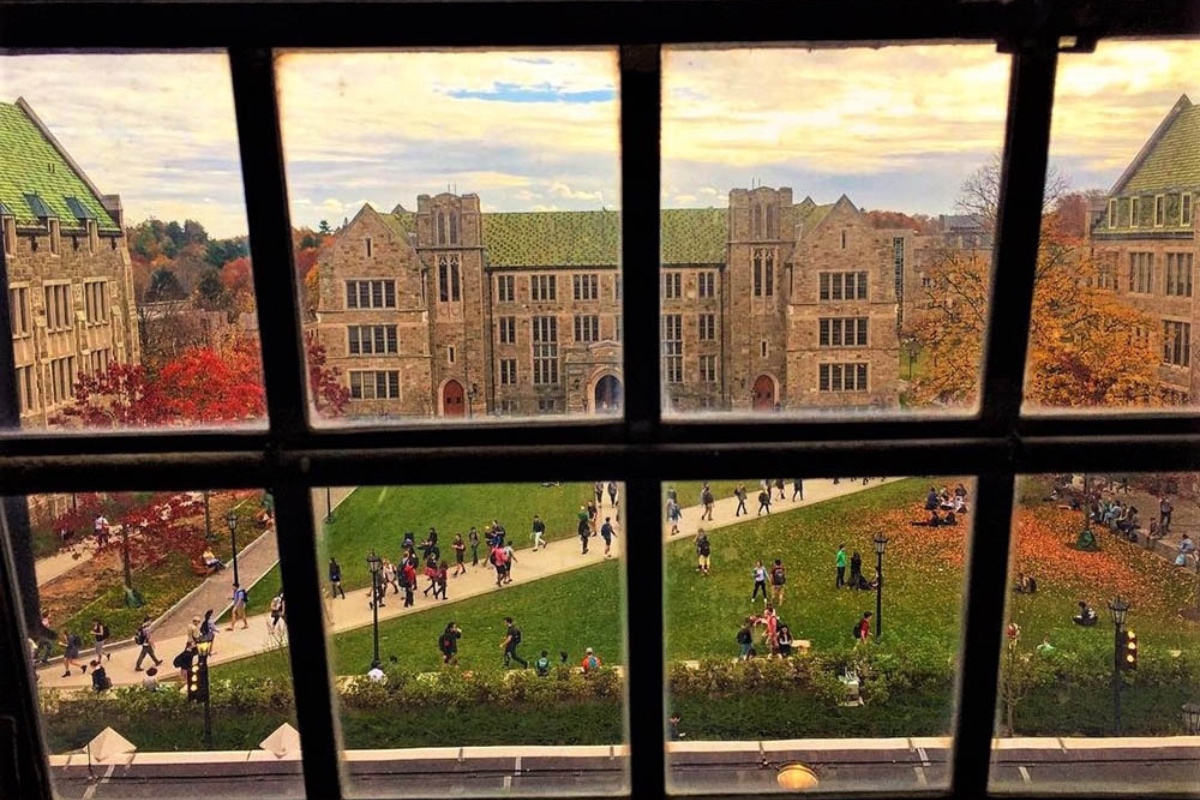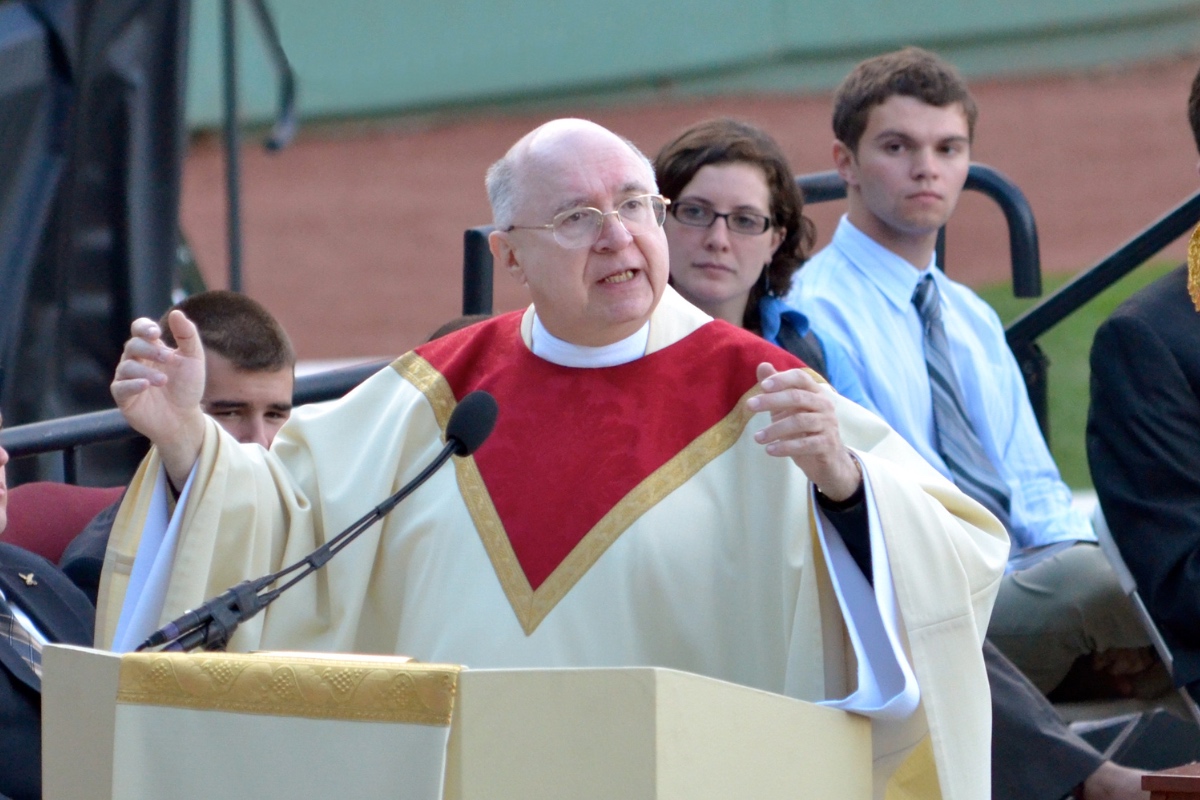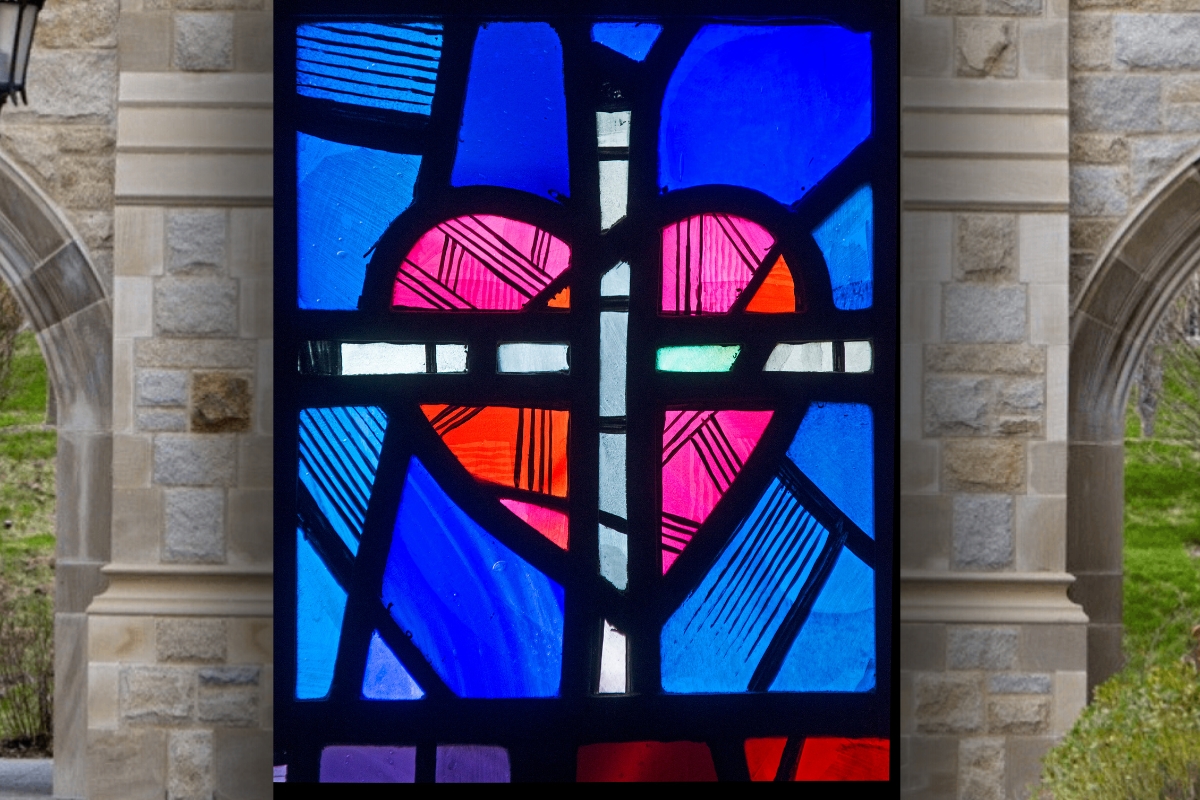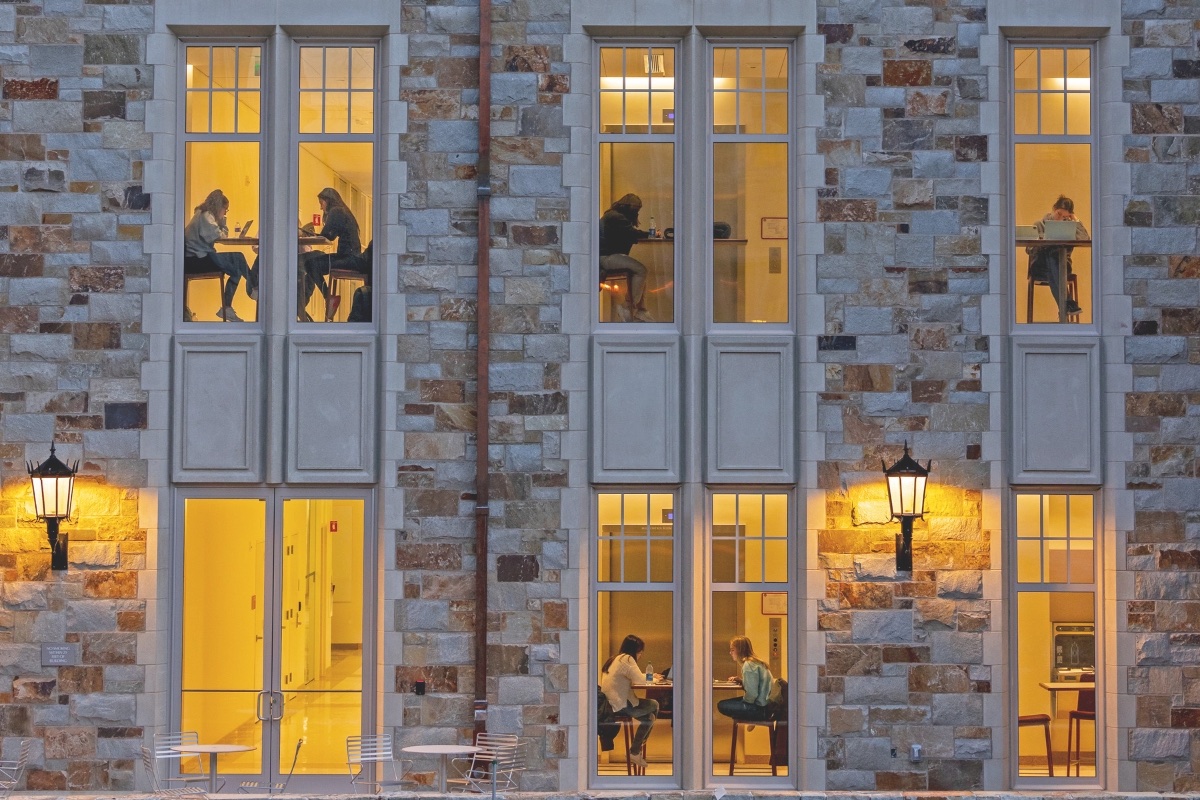I recently attended a Halftime retreat—a three-day experience that invites sophomore students to reflect on living a life of meaning and purpose. They were privileged days in Dover, MA of listening to our students reflect on their experiences on the Heights and asking life’s big questions. I was transported back more than two decades to my own journey of discernment, not necessarily my path to Jesuit life, but more broadly to the non-linear reflection about career and vocation I engaged in as a college student myself. I recalled the twists and turns of trying to figure out what the late Father Michael Himes framed here as the three key questions: What brings me joy? What am I good at? Who does the world need me to be? While at Dover, I thought about my own Jesuit education at Loyola Marymount University in Los Angeles, CA. I don’t recall going on anything quite like Halftime, but I realized throughout my undergraduate Jesuit education that the degree I was earning was intended to make an impact on the world around me. To do anything less with it would squander its value.
DISCOVERING A PURPOSEFUL LIFE
In my freshman year of college, the 9/11 attacks disrupted the world as we knew it and brought many of us to consider how we all fit together. Although I was safely some 3,000 miles away in Los Angeles, those events recalibrated my worldview and prompted me to keep questions of living a purposeful life front and center in my collegiate years. I was moved by the show of humanity at its best, how communities around the nation rallied to respond with care in the wake of disaster, and wondered about my own contribution to the needs of those I encountered. I recall one formative experience was when a group of my classmates and I were assigned a project at Homeboy Industries—an organization founded by Father Greg Boyle, S.J., to provide rehabilitation and re-entry for formerly gang-involved women and men. Our specific project seems irrelevant now, but the experience was a moment of seeing how someone was using his education for the good of those around him. I wondered about my own contribution. Who did the world need me to be?
When I was getting ready to join the Jesuits, I remember packing up the few things on a checklist we were allowed to bring with us—only what was essential we were told. Not on the list was the diploma I received from Loyola Marymount just a few months before. As the first in my family to complete college, that piece of paper was hard-won. Not knowing what to do with it, my parents kept it for safekeeping. When I visited them some months later, it was clear the diploma would never make it back to me: my mom had it framed and proudly put it on display at their home. I was happy my parents could share in the joy of that degree, as it was theirs as much as it was mine. When I think of that piece of paper now—still hanging in its frame at my parents’ home—it reminds me that the degrees we earn are meant to be shared with others, much like the education we receive. I’ve been trying to do that ever since. I did end up getting another copy of that diploma, but the original is where it belongs.
I realized throughout my undergraduate Jesuit education that the degree I was earning was intended to make an impact on the world around me. To do anything less with it would squander its value.
DEVELOPING THE MISSION
I think it’s my life as a Jesuit, though, that has attuned my eyes to see where my contribution is most needed. I’m honored now to serve as the founding dean of Messina College, Boston College’s ninth school, which will welcome its inaugural class of students this July. The mission of Messina College is to serve students not too different from my own background—students who are the first in their families to attend college and who likely didn’t have college at the forefront of their minds. Through a fully residential associate’s degree program, Messina College is intentionally designed to support first-generation students with high financial need. Beyond academic support, the model takes a holistic view of students and invites them to experience the transformative Jesuit education we know well at Boston College (BC) and elsewhere. Our Messina students will engage the Core Curriculum and choose from one of four majors, each aligned with learning goals of an existing undergraduate program: Applied Data Science, Applied Psychology and Human Development, Health Sciences, or General Business. Upon completing their associate’s degrees at Messina College, graduates will have pathways to complete bachelor’s degrees (including at BC) and opportunities for skilled entry into the workforce.
CONNECTING TO THE PAST
The very name of our new college—Messina—is appropriate for the program we are developing on BC’s new Brookline Campus (formerly Pine Manor College), as it is tied to the historical roots of Jesuit education. It was in the port city of Messina, Sicily, that the newly founded Jesuits opened their first school in 1548, accessible to students regardless of their economic background. It was the local community of Messina that invited the Jesuits to found a school for the education of their children. Boston College’s own beginnings in the South End of Boston in 1863 are not too different from this story. BC was to be Boston’s college, established at the invitation of the bishop to educate the predominantly Catholic and immigrant communities (though religious affiliation was never a bar to admission). And so, Messina College brings us full circle to these stories of beginnings, as BC makes another intentional commitment to expand college access and provide robust resources to support student success.
As we recruit students to Messina College primarily from Massachusetts and Rhode Island, I see in our prospective students both excitement and uncertainty about what lies ahead. I remember sharing this experience, not having many people to talk to about applying to college or about navigating college life. As first-generation students, college presents many unknowns. Our proposition at Messina College is to remove that uncertainty and create a small-school setting within a leading Jesuit university where our students feel they belong.
Thanks to BC’s Office of Undergraduate Admission, our class is already taking shape. We made history together when on January 16, 2024, we admitted the first group of students through the Early Decision process. I had the opportunity to call some of the admitted students later that week, and I will never forget the brief conversations I shared with them—hearing their exuberance of being invited to something new and the understanding that they will imprint Messina’s story with their stories.
I am humbled that this is the way I’m giving away my degrees today. Building the foundation of Messina College has been a privilege, but I have not done it alone. Messina benefits from collaborations across the University community. I am proud to say that this is a BC initiative in the fullest sense. Come July 2024, Messina College will welcome its first undergraduates. We will welcome them to the best that BC has to offer—to our formative education and mentorship, clubs and intramurals, retreats and service. And, in two years when they receive their diplomas, my hope is that they, too, will recognize what the world needs from them.
Erick Berrelleza, S.J., is a Jesuit priest of the USA West Province and founding dean of Messina College, Boston College’s first associate degree program which began courses in the 2024–25 academic year.
For more information on Messina College, visit: bc.edu/messina-college
Photo: Dean Erick Berrelleza, S.J., and students at the first Accepted Students Day for Messina College. Photo credit: Courtesy of Lee Pellegrini, Boston College.



